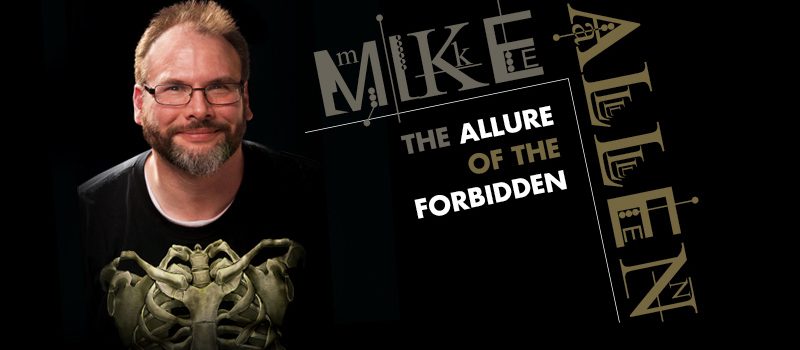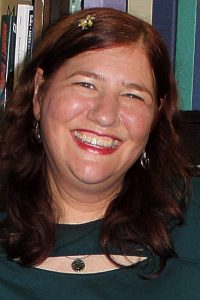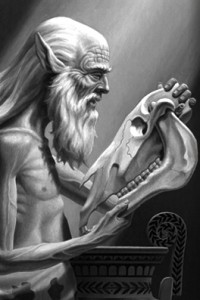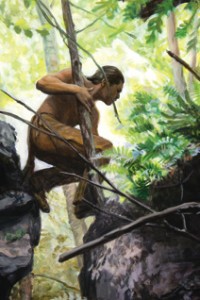Mike Allen: The Allure of the Forbidden
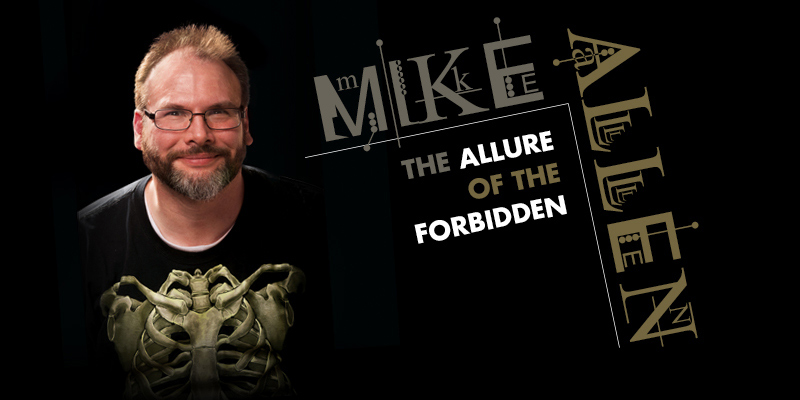
MICHAEL LOUIS ALLEN was born February 1, 1969 in Minneapolis MN to academic parents, who moved often for teaching jobs. He lived in Guam until after kindergarten, spent a year outside Chicago, then spent eight years in the small mining town of Wise VA before finally settling in Roanoke VA, where he has lived ever since. He graduated from Virginia Tech with a liberal arts degree, then earned his Master’s in creative writing at Hollins University. He worked four years in a department store before becoming a writer for the Roanoke Times 19 years ago, covering a variety of subjects before becoming their arts columnist in 2009.
Allen began publishing stories in the early ’90s, and has published scores of stories since, mostly in the small press. “The Button Bin” (2007) was a Nebula Award finalist, and collection Unseaming (2014) was a finalist for the Shirley Jackson Award. More work is collected in The Spider Tapestries (2016). Debut novel The Black Fire Concerto appeared in 2013.
He is also a prolific poet, with work collected in Defacing the Moon (2000), Petting the Time Shark and Other Poems (2003), Disturbing Muses (2005), Strange Wisdoms of the Dead (2006), The Journey to Kailash (2008), and Hungry Constellations (2014). “Epochs in Exile: A Fantasy Trilogy” (2002, with Charles Saplak), “The Strip Search” (2005), and “The Journey to Kailash” (2006) were all Rhysling Award winners. He served as president of the Science Fiction Poetry Association from 2004-06.
Allen is also an editor and publisher, best known for his journal Mythic Delirium, founded in 1998 and still ongoing. Before that he edited three issues of Event Horizon with Daniel D. Adams (1997-98). He edited anthologies New Dominions (1995); The Alchemy of Stars: Rhsyling Award Winners Showcase (2005) with Roger Dutcher; Mythic (2006) and Mythic 2 (2006); and Mythic Delirium (2014) and Mythic Delirium Volume Two (2015), both with wife Anita Allen (married 1992). He created and edits the Clockwork Phoenix anthology series, launched in 2008. The latest volume, Clockwork Phoenix 5 (2016), was a World Fantasy Award finalist. He also runs his own small press, Mythic Delirium Books.
Excerpts from the interview:
“In a way, even though I’ve been at this for 25 years, I guess you could call me a late bloomer. It took me a long time to decide on pursuing writing. I was cursed with too many possibilities. I had enough visual artistic talent that the people around me were convinced that was what I should pursue: drawing, painting. I started out at Virginia Tech as an art student. I did reasonably well, but ultimately found that as much as I enjoyed creating art, it didn’t have deep enough hooks in me for it to become a lifelong love.
“Ultimately what I used my talent for was to draw the monsters in my D&D campaign. I ran a D&D campaign all four years I was an undergraduate. I put way more effort into that than I did my actual classes. By my junior and senior year I had lost interest in just making everything a gorefest, and began to concentrate on a story that had a through line. I had a wonderful group of players, a couple of whom I’m still in touch with, who became the protagonists. The story became an epic fantasy quest, and it actually concluded. The final session that concluded the story happened the last day of exams my senior year. It was an integral part of my life. By then I had gotten much more serious about writing.
“After I graduated, I sold a story to a pay-in-copy magazine that nobody remembers now. That was just enough writing success for me to trick myself into continuing. I didn’t get a lot of encouragement to pursue writing, especially not from home, and so I had a lot of uncertainty about whether I should. I continued to have that, even as I began getting stories published. It took a while for the uncertainty to subside.
“I confess there is a mundane reason why I ended up chasing poetry as much as I did: it’s what I started selling first. Also, I honestly thought all science fiction and fantasy writers wrote both poetry and fiction. The reason had to do with my unguided childhood explorations of what fantasy literature was supposed to be.
“My father’s favorite book was The Lord of the Rings, and he made me read that. I read it in fourth grade, and read The Hobbit previously. I absolutely loved it. My dad felt The Lord of the Rings was the pinnacle of novel writing. As far as he was concerned, the perfect novel existed, so no one else needed to write more. Obviously the fantasy literature industry didn’t feel that way, and I didn’t feel that way – I for sure wanted more. But I didn’t have any peers who were into reading the same sort of things I was into at the same level of interest I had. I had no guidance for how to find other works like that except what I could dig up in writings about Tolkien’s work. I read this essay by Colin Wilson about Tolkien’s place in the literary canon, and he kept referring to this writer named Lovecraft, as a fantasist. So I thought, ‘Oh, there’s this other fantasy writer I need to seek out.’ I was still a kid, mind you. The first Lovecraft story and I read is the first story in a book called A Treasury of Modern Fantasy edited by Terry Carr: ‘The Rats in the Walls’. That freaked me out pretty badly too, but I wanted to read more Lovecraft, even though I was more terrified of going down into my basement than ever before. It turned out our little library in Wise had some Lovecraft, so I read that. ‘Pickman’s Model’ traumatized me for years.
“So that’s one example of what trying to find more Lord of the Rings did for me. Tolkien led me to Asimov and Le Guin, and Zelazny, Ellison, Lovecraft, and King, but it also got me reading poetry. It actually goes back to that Colin Wilson essay describing other works that deserved comparison to The Lord of the Rings – he talked about T.S. Eliot’s The Waste Land. So there I was, nine or ten years old, reading The Waste Land, trying to comprehend what that poem was even about, being absolutely fascinated by the tarot imagery, the Arthurian imagery, and references to Hindu culture. The poem refers to an unreal city populated by the dead. That’s not so far outside of straight up horror and the Weird.
“With that kind of drop into the deep end, I started a lifelong interest in poetry that I imagine comes from a really different angle than what’s typical for those who write literary poetry. My interest got reinforced by the subscription to Asimov’s I had as a teenager. Asimov’s publishes poetry regularly, so I had no idea there was anything odd about science-fiction poetry. I assumed, like I said, that people who write science fiction also write poetry. I experimented with both.
“When I seriously started pursuing getting published, I wrote and sent out stories and poetry, and the poetry was what I sold most often. In a basic, ‘push the button, get the reward’ way, I went after that with more vigor. I also workshopped my poems in grad school. I’m not sure what my professors at Hollins made of my poetry, but they did give me good pointers.
“Fast forward to a point where I’ve published a lot of poetry, and I pick up a Rhysling nomination. I’d never heard of the Science Fiction Poetry Association before. After that happened, I started participating as an editor, because I had started publishing Mythic Delirium at that time. The original version of my magazine published only poetry. The reason why I was publishing poetry was because that’s what I felt I had time to do. I go back and read those early issues, and I didn’t do a bad job, but I wouldn’t say I knew what I was doing.
“It kind of snowballed. Anita and I went to an Arisia in the early 2000s and I attended a SFPA meeting and came away feeling that I could bring a level of vitality to the organization that it didn’t currently possess. That ultimately led to me running for president. The deeper I got into the internal structure of the science fiction poetry world, the more seriously I took poetry overall. I discovered Billy Collins, and a number of other poets. I got more dedicated to it than ever, and produced the best poetry that I’m ever going to produce. I’m not saying that it was the greatest poetry ever, but it’s the best I’m going to write.
“I wish that the folks in genre acknowledged poetry more, because, as a medium, there are a lot of things that can be done in poetry that you lose once you switch to the needs of narrative that prose tends to require.”
Interview design by Stephen H. Segal. Photo by Beth Gwinn. Read the complete interview in the December 2017 issue of Locus Magazine.


